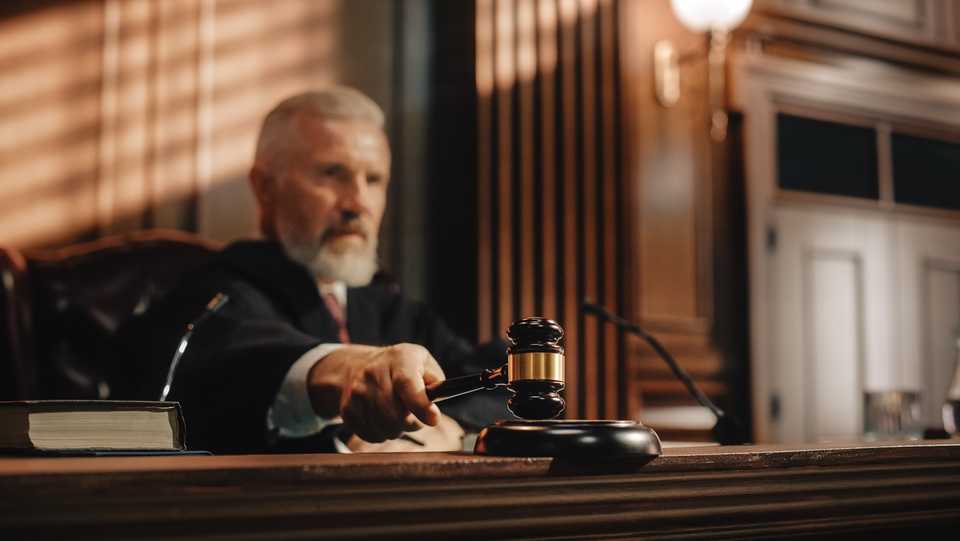A person accused or convicted of a criminal offense will necessarily have to face a criminal penalty.
If we rely on popular belief, criminal punishment is synonymous with imprisonment. However, this is not always the case. In Canadian criminal law, there are different types of penalties that will apply according to certain criteria, such as the severity of the offense, the recurrence of the accused, etc. Between assault or armed robbery, the penalties for a criminal act are varied.

Indeed, the Criminal Code provides several types of penalties that can be applied by the court. The process of determining the sentence is rather complex, and the court will take into account several circumstances specific to each case.
Are you facing a criminal charge? It is important to familiarize yourself with the different possible sanctions in case of a guilty verdict. JuriGo then presents you with all possible criminal penalties in Quebec!
1. Absolution in criminal law: not a sentence like the others!
It should be known that in criminal law, the absolution is the most lenient sentence that can be granted to you by the court. Absolution allows the judge to acknowledge that you are guilty of the offense you are accused of, without however imposing a traditional sentence on you.
If the court grants you a sentence of absolution, you will not have a criminal record and therefore you will be considered not to have been convicted for this offense. This sentence is particularly advantageous for individuals who would be most affected by a criminal record, such as professionals or people who often travel abroad.
Attention, absolution is not necessarily an easy sentence to obtain. First, it is necessary to know that not all criminal offenses open the door to absolution.
Any offense punishable by a minimum sentence or a maximum imprisonment sentence of 14 years or more does not allow for absolution. For example, you could be absolved for a "simple" assault offense, as it is not accompanied by a minimum sentence.
On the other hand, you could not be absolved for a robbery offense, as it is punishable by a maximum imprisonment sentence of 14 years or more.
In addition, absolution can only be granted if certain conditions are met: absolution is in the true interest of the accused and does not harm the public interest.

To conclude, we must distinguish between two types of absolution: conditional absolution and unconditional absolution. Conditional absolution , as its name suggests, depends directly on the respect of certain conditions.
If you are granted a conditional absolution, you will only be absolved if you respect the court's conditions, and in the meantime, you will have a temporary criminal record.
Unconditional absolution , on the other hand, implies that the court does not impose any additional sentence or condition to be respected to be absolved.
How to obtain a sentence of absolution? This is where the criminal lawyer comes into play! Absolution is the most lenient sentence that can be granted to you, so it is important to call on a specialized professional to help you obtain the best possible outcome!
2. The fine penalty in criminal law: paying for your crime!
One of the most popular penalties is obviously the fine. You probably know that a court can ask the convicted person to pay a fine when the crime they are guilty of does not carry a minimum prison sentence.
Most often, the fine penalty will be applied foreconomic crimes, such as theft or fraud. In other cases, the fine will constitute a minimum penalty for an offense that also opens the door to a prison sentence. This is indeed the case for the first offense of impaired driving, whose minimum penalty is a fine.
Unless it is a minimum penalty, the judge must ensure that the convicted person is able to pay the fine if he decides to impose this penalty. So what happens to the offender who cannot afford to pay a fine? It's quite simple, he will have to pay it off by completing compensatory work with a recognized organization.
3. The probation order: freedom "on condition of..."
The probation order is another type of sentence that the court can choose to impose on the convicted person. It is then for the court to impose certain conditions to be respected by the offender found guilty of a criminal offense. If the offender does not respect one or more of the court's conditions, they face severe legal consequences.
The probation order is a sentence that allows the individual found guilty to maintain a certain freedom as long as they respect restrictive conditions that are very specific. The probation order has a maximum duration of 3 years.
The probation order can be granted in two forms: as the only sentence or in addition to another sentence.
In the first case, it will be a matter of a suspended sentence. When the offense does not provide for a minimum penalty, the probation order may be the only punishment inflicted on the offender. The latter will therefore need to ensure that they follow the terms of their probation to the letter, under penalty of having their probation order revoked and a more serious penalty imposed.
Probation can also be added to another sentence , such as a maximum prison sentence of 2 years or a fine.
The probation order must necessarily contain certain conditions, as provided for in the Criminal Code, regardless of the situation of the offender:
- Do not disturb public order and have good conduct;
- Respond to any court summons;
- Notify the court or probation officer of any address change or name and promptly notify them of any change in employment or occupation.

The court may also include in the probation sentence other optional conditions which, they will depend on the offender's situation.
For example, the offender can be forced to complete weekly follow-ups with his probation officer, be prohibited from communicating with certain people, be prohibited from consuming drugs or alcohol, be required to do community service hours, etc.
The breach of probation is a situation severely punished by the courts. Indeed, in the event of failure to meet the conditions of probation, the offender commits a criminal offense punishable by a maximum imprisonment of 4 years.
4. The prison sentence in criminal law
Finally, it is important to say a few words about the type of sentence most known and severe in criminal law:the prison sentence. Unlike the sentences described above, imprisonment is the highest form of deprivation of freedom for a convicted person.
Imprisonment may be the minimum penalty for certain offenses, while other offenses will not necessarily lead to imprisonment. Before imposing this sentence, the court will have toconsider if it is possible to inflict a less stringent penalty on the convicted person. However, the determination of the sentence will depend on a multitude of factors, such as the severity of the offense and the behavior of the defendant.
When we talk about imprisonment, we directly think of the sentence to be served continuously in a prison or penitentiary. However, it is important to mention that there aretwo types of imprisonment which constitute penalties somewhat more lenient than the traditional imprisonment sentence.
The community imprisonment sentence
The imprisonment in the community, also called suspended imprisonment, will allow the offender to serve his sentence outside of a prison establishment. This type of sentence is subject to many conditions that the court must evaluate, which significantly restricts its application. Here are the criteria imposed by the law:
- Imprisonment must last less than 2 years;
- The sentence will not endanger the safety of the community;
- The offense is not punishable by a minimum prison sentence;
- The offense, if prosecuted by criminal act, must not be punishable by a prison sentence of 14 years or more;
- The offense must not be prosecuted by criminal act, punishable by imprisonment of 10 years or more and:
- Have caused bodily harm;
- Have involved the import, export, trafficking or production of drugs;
- Have involved the use of a weapon.

The restrictive conditions do not stop there. In addition to all of this, the Criminal Code prohibits the imposition of a community imprisonment sentence for certain offenses, for example:
- Sexual assault;
- Theft of a value of more than $5000;
- Breaking and entering into a place other than a residential house.
The suspended imprisonment sentence is also subject tomandatory conditions in order to regulate the activities of the offender. Just as is the case for probation, the court must order the offender not to disturb the public order and to have good conduct, to appear in court, to report to the surveillance officer and to remain within the jurisdiction of the court.
In case of breach of probation conditions, the court can order sanction measures. For example, it can order that the offender completes the remainder of his sentence in a prison facility.
The discontinuous sentence or "weekend imprisonment"
Finally, the court can allow the convicted individual to serve his sentence in a discontinuous manner, that is, in blocks of a few days per week. It will then be a question of a discontinuous imprisonment sentence.
This type of sentence will often apply to workers who could lose their jobs if they serve their imprisonment sentence continuously. Be careful, this option will not be accessible to all offenses.
The discontinuous sentence is only possible for imprisonments of a maximum duration of 90 days. Before applying this kind of sentence, the court will take into account a multitude of factors, such as the offender's conduct, the offense and the circumstances in which it was committed.
JuriGo helps you find a criminal lawyer for any question related to the sentence!
As you may have noticed, there are several types of criminal sentences in Canadian law. If you are accused of committing a criminal offense, you are now better informed of the potential sanctions that could be imposed on you if you are found guilty.
In this case, it is important that you seek the help of a lawyer specialized in criminal law as soon as possible so that he/she can represent and defend you in court.
The importance of being represented by a lawyer does not stop at the stage of the declaration of guilt or acquittal. If you are found guilty, your lawyer can also assist you in determining the sentence and help you get the most lenient sentence possible, such as absolution!
And how to find a criminal lawyer quickly? It can be done in a few clicks thanks to JuriGo!
You just have to fill out the request form below and we will put you in contact with a criminal lawyer in your area.
This referral is free and does not commit you to anything, so don't hesitate any longer to defend your fundamental rights!